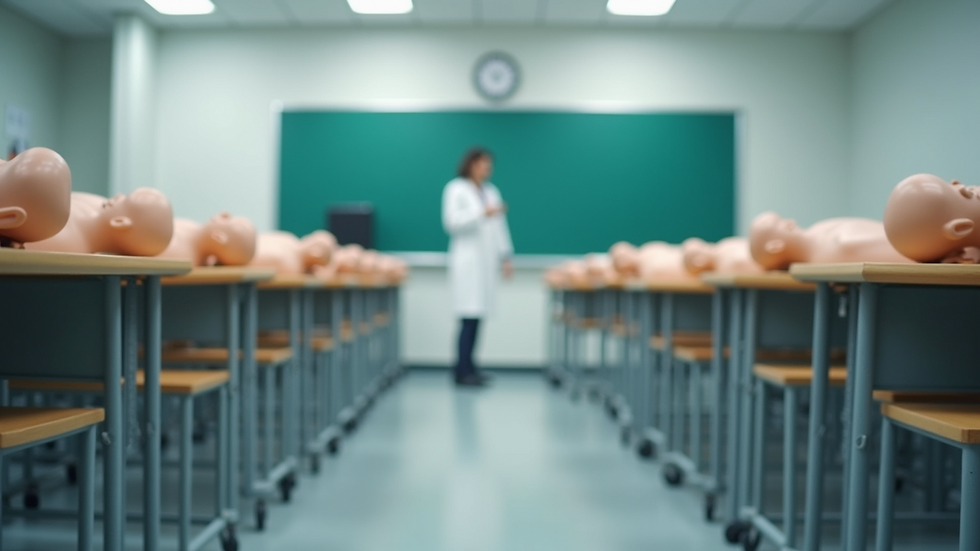In a cardiac emergency situation, CPR training from people nearby can make a difference
- Oct 26, 2022
- 3 min read

The American Heart Association recommends everybody to attend CPR training as this can make a difference in a cardiac emergency situation.
Ashley Goette, a soon-to-be mother, woke up at 5:00 in the morning to what she thought she heard her husband snoring, but then he was unresponsive and struggling for air.
Ashley dialed 911, the operator recognized that Andrew was having a cardiac arrest and guided Ashley through performing CPR until the ambulance came.
Ashley, who was pregnant at the time, was asked by the operator if she could move Andrew onto the floor, but he was too heavy for her to move. The operator didn't waste any time instructing Ashley to remove the pillow from Andrew's head, and she began teaching her how to perform chest compressions there on the bed. The operator guided Ashley's heartbeat and instructed her on where and how hard to press her palms into his chest.
Though it seemed much longer, it took first responders and the ambulance 10 minutes to show up.
Ashley was instructed to expect the worst while Andrew had a variety of tests and procedures in the hours that followed. She postponed her scheduled induction at a different hospital and stayed at Andrew's bedside instead.
Andrew had Wolff-Parkinson-White syndrome, a rare disorder in which an additional electrical pathway in the heart results in a rapid heartbeat.
The following day, fortunately, he was making progress toward a full recovery, and Ashley was given the all-clear to go into labor while Andrew slept next to her in his own hospital bed.
Their tale does indeed have a happy ending, with the three members of the family returning home to begin a new life together. They are really grateful to the medical professionals and emergency personnel who assisted them, including the 911 dispatcher who initially assisted Ashley prior to the ambulance's arrival.
Nearly all cardiac arrests are followed by a call to 911 for assistance. When first responders are en route, 911 telecommunicators with the appropriate skills can walk callers through performing CPR. The odds of survival can be doubled or even tripled with immediate bystander CPR.
Ashely was aware Andrew required CPR, but her previous CPR training was twelve years ago, so she wanted someone to direct her and reassure her that she was performing it correctly at that precise moment.
Ashley was unaware at the time that not all 911 operators have CPR Certification. Like most people, she thought this was standard procedure.
It was considered a blessing that the person who answered her call had completed CPR training and had BLS Certification to provide her with this further direction.
"Without it, I'm not sure what may have happened. Nobody should be forced to. In order to ensure that every caller, like me, may receive the information they require to assist a loved one in need."





AV在线看 AV在线看;
自拍流出 自拍流出;
国产视频 国产视频;
日本无码 日本无码;
动漫肉番 动漫肉番;
吃瓜专区 吃瓜专区;
SM调教 SM调教;
ASMR ASMR;
国产探花 国产探花;
强奸乱伦 强奸乱伦;
AV在线看 AV在线看;
自拍流出 自拍流出;
国产视频 国产视频;
日本无码 日本无码;
动漫肉番 动漫肉番;
吃瓜专区 吃瓜专区;
SM调教 SM调教;
ASMR ASMR;
国产探花 国产探花;
强奸乱伦 强奸乱伦;
代发外链 提权重点击找我;
蜘蛛池 蜘蛛池;
谷歌马甲包/ 谷歌马甲包;
谷歌霸屏 谷歌霸屏;
谷歌霸屏 谷歌霸屏
蜘蛛池 蜘蛛池
谷歌快排 谷歌快排
Google外链 Google外链
谷歌留痕 谷歌留痕
Gái Gọi…
Gái Gọi…
Dịch Vụ…
谷歌霸屏 谷歌霸屏
负面删除 负面删除
币圈推广 币圈推广
Google权重提升 Google权重提升
Google外链 Google外链
google留痕 google留痕
代发外链 提权重点击找我;
游戏推广 游戏推广;
Fortune Tiger Fortune Tiger;
Fortune Tiger Slots Fortune…
谷歌马甲包/ 谷歌马甲包;
谷歌霸屏 谷歌霸屏;
מכונות ETPU מכונות ETPU;
;ماكينات اي تي بي…
آلات إي بي بي…
ETPU maşınları ETPU maşınları;
ETPUマシン ETPUマシン;
ETPU 기계 ETPU 기계;
google seo google seo技术飞机TG-cheng716051;
03topgame 03topgame
gamesimes gamesimes;
Fortune Tiger Fortune Tiger;
Fortune Tiger Slots Fortune Tiger…
Fortune Tiger Fortune Tiger;
EPS машины EPS машины;
Fortune Tiger Fortune Tiger;
EPS Machine EPS Cutting Machine;
EPS Machine EPS and EPP…
EPP Machine EPP Shape Moulding…
EPS Machine EPS and EPP…
EPTU Machine ETPU Moulding Machine
EPS Machine EPS Cutting Machine;